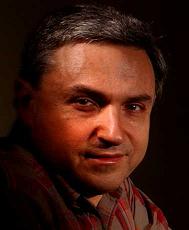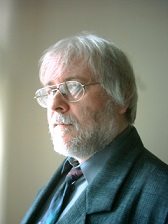Boris Stilman
University of Colorado Denver, USA & STILMAN Advanced Strategies, USA
Title: From Fighting Creative Wars to Making Ordinary Discoveries
Abstract:
I will introduce participants to the hypothesis of the Primary Language of the human brain (according to J. von Neumann). I will suggest that the Primary Language includes at least two major components critical for humanity, Linguistic Geometry (LG) and the Algorithm of Discovery. LG is a type of game theory scalable to solving complex real world problems that are considered intractable by conventional approaches. Modern applications of LG, related to the US national defense, generate, in real time, courses of action that are highly creative and even exceed the level of those developed by human commanders. The second component of the Primary Language is the Algorithm of Discovery. This suggestion is based on the hypothesis that there is a universal Algorithm of Discovery, i.e., the algorithm for developing new algorithms, driving all the innovations and, certainly, the advances in all sciences. Our research on discovering and implementing this Algorithm in software will lead to the situation when making discoveries will be an ordinary procedure.
Short Bio
 Dr. Stilman is currently Professor of Computer Science at the University of Colorado Denver (UC Denver), USA and the Chairman & CEO at STILMAN Advanced Strategies (STILMAN), USA. Boris Stilman received MS in Mathematics from Moscow State University (MGU), USSR in 1972 and two Ph.Ds in Electrical Engineering and Computer Science from National Research Institute for Electrical Engineering (VNIIE), Moscow, USSR in 1984. In 1972-1988, in Moscow, he was involved in the research project PIONEER led by a former World Chess Champion Professor Mikhail Botvinnik. The goal of the project was to discover and formalize an approach utilized by the most advanced chess experts in solving chess problems almost without search. While program PIONEER had never played complete chess games, it solved a number of complex endgames and positions from the games of World Chess Champions. Based on these experiences over a number of years, in Moscow, Dr. Stilman developed experimental and mathematical foundations of the new approach to search problems in Artificial Intelligence. In 1990-91, while at McGill University, Montreal, Canada, based on this approach, he originated Linguistic Geometry (LG), a new theory for solving abstract board games. LG allows us to overcome combinatorial explosion by changing the paradigm from search to construction (from analysis to synthesis). Since 1991, Dr. Stilman was developing the theory and applications of LG at UC Denver. A leap in the development LG was made in 1999, when he (with a group of scientists and engineers) founded STILMAN, LLC. A growing number of applications of LG developed at STILMAN have passed comprehensive testing and are currently being transitioned to the real world command and control systems in the USA and abroad. Since 2010, Dr. Stilman was investigating the structure of the Primary Language of the human brain (following J. von Neumann). According to his hypothesis the Primary Language includes at least two major components critical for humanity, LG and the Algorithm of Discovery. Dr. Stilman published several books (including "Linguistic Geometry: From Search to Construction"), contributions to books, and over 200 research papers. He is a recipient of numerous R&D awards, including the top research awards at University of Colorado, substantial grants from the US government agencies such as major multiple awards from DARPA, US Dept. of Energy, US Army, US Navy, US Air Force, etc.; Ministry of Defence of UK; from the world leading defense companies such as Boeing (USA), Rockwell (USA), BAE Systems (UK), SELEX/Finmeccanica (Italy-UK) and Fujitsu (Japan). More information about Dr. Stilman, history of LG and projects (including several narrated movies) can be found at www.stilman-strategies.com
Dr. Stilman is currently Professor of Computer Science at the University of Colorado Denver (UC Denver), USA and the Chairman & CEO at STILMAN Advanced Strategies (STILMAN), USA. Boris Stilman received MS in Mathematics from Moscow State University (MGU), USSR in 1972 and two Ph.Ds in Electrical Engineering and Computer Science from National Research Institute for Electrical Engineering (VNIIE), Moscow, USSR in 1984. In 1972-1988, in Moscow, he was involved in the research project PIONEER led by a former World Chess Champion Professor Mikhail Botvinnik. The goal of the project was to discover and formalize an approach utilized by the most advanced chess experts in solving chess problems almost without search. While program PIONEER had never played complete chess games, it solved a number of complex endgames and positions from the games of World Chess Champions. Based on these experiences over a number of years, in Moscow, Dr. Stilman developed experimental and mathematical foundations of the new approach to search problems in Artificial Intelligence. In 1990-91, while at McGill University, Montreal, Canada, based on this approach, he originated Linguistic Geometry (LG), a new theory for solving abstract board games. LG allows us to overcome combinatorial explosion by changing the paradigm from search to construction (from analysis to synthesis). Since 1991, Dr. Stilman was developing the theory and applications of LG at UC Denver. A leap in the development LG was made in 1999, when he (with a group of scientists and engineers) founded STILMAN, LLC. A growing number of applications of LG developed at STILMAN have passed comprehensive testing and are currently being transitioned to the real world command and control systems in the USA and abroad. Since 2010, Dr. Stilman was investigating the structure of the Primary Language of the human brain (following J. von Neumann). According to his hypothesis the Primary Language includes at least two major components critical for humanity, LG and the Algorithm of Discovery. Dr. Stilman published several books (including "Linguistic Geometry: From Search to Construction"), contributions to books, and over 200 research papers. He is a recipient of numerous R&D awards, including the top research awards at University of Colorado, substantial grants from the US government agencies such as major multiple awards from DARPA, US Dept. of Energy, US Army, US Navy, US Air Force, etc.; Ministry of Defence of UK; from the world leading defense companies such as Boeing (USA), Rockwell (USA), BAE Systems (UK), SELEX/Finmeccanica (Italy-UK) and Fujitsu (Japan). More information about Dr. Stilman, history of LG and projects (including several narrated movies) can be found at www.stilman-strategies.com
Andrzej M.J. Skulimowski
Title: The Art of Anticipatory Decision Making
Abstract: TBA
This lecture outlines the theory of anticipatory networks and presents its recent advances and applications in future-oriented and creative decision-making. Anticipatory networks generalize earlier models of consequence anticipation in multicriteria decision problem solving as well as the famous Rosen's theory of anticipatory systems. The main assumption of this theory is that the decision maker takes into account the anticipated outcomes of future decision problems linked in a prescribed manner by the causal relations with the present problem. This is why constructive computational methods may be applied to find solutions that fulfil the requirements concerning the expected impact on the future. This approach links forecasting of future circumstances and parameters with the anticipation of human decisions in a unique way. The solution process can be illustrated by a multigraph of decision problems linked causally (the first group of relations) and representing one or more additional anticipation relations. Such multigraphs are termed anticipatory networks. We will also present the new notion of a superanticipatory system, which is an anticipatory system that contains a future model of at least one anticipatory system beside itself. It will be shown that non-trivial anticipatory networks are superanticipatory systems and that the problem solving methodology based on anticipatory networks is an instance of a creative decision process. Finally, we will discuss selected applications of anticipatory networks: to establish efficient collaboration of teams consisting of humans as well as of robots and to build a network of interrelated scenarios in technological foresight.
Short Bio
 Andrzej M.J. Skulimowski is a Professor and the Director of the Decision Sciences Laboratory at the Department of Automatic Control and Biomedical Engineering, AGH University of Science and Technology. Since 1995, he has been also the President of the International Progress and Business Foundation, Krakow, where he has led over 80 research, consulting and policy support projects within the EU Framework Programs, ESTO, ETEPS, Interreg, LLP, ERDF, GTD, and other programs. He graduated in Electronics at AGH University, and in Mathematics at the Jagiellonian University, Krakow, Poland. He was awarded a PhD degree in Automatic Control with honors in 1985 and a DSc degree in Operations Research in 1997, both from AGH University. He was a postdoctoral fellow at the Institutes for Automatic Control and for Communication Technology, both at the ETH, Zurich, Switzerland (1987-89), and a visiting professor at the Institute of Information Management at the University of St. Gallen (1990-1995). His main field of expertise is multicriteria decision analysis, cognitive aspects of decision and creativity support systems, foresight, R&D policy, and forecasting. He is the author and editor of 9 books and over 200 scholarly papers on these topics. He invented the anticipatory networks, coined the term mHealth and defined its major challenges, and is one of the pioneers of foresight support systems and advanced approaches to AI foresight. He was the General Chair of the 8th International Conference on Knowledge, Information and Creativity Support Systems (KICSS) held in Krakow, Poland, in November 2013.
Andrzej M.J. Skulimowski is a Professor and the Director of the Decision Sciences Laboratory at the Department of Automatic Control and Biomedical Engineering, AGH University of Science and Technology. Since 1995, he has been also the President of the International Progress and Business Foundation, Krakow, where he has led over 80 research, consulting and policy support projects within the EU Framework Programs, ESTO, ETEPS, Interreg, LLP, ERDF, GTD, and other programs. He graduated in Electronics at AGH University, and in Mathematics at the Jagiellonian University, Krakow, Poland. He was awarded a PhD degree in Automatic Control with honors in 1985 and a DSc degree in Operations Research in 1997, both from AGH University. He was a postdoctoral fellow at the Institutes for Automatic Control and for Communication Technology, both at the ETH, Zurich, Switzerland (1987-89), and a visiting professor at the Institute of Information Management at the University of St. Gallen (1990-1995). His main field of expertise is multicriteria decision analysis, cognitive aspects of decision and creativity support systems, foresight, R&D policy, and forecasting. He is the author and editor of 9 books and over 200 scholarly papers on these topics. He invented the anticipatory networks, coined the term mHealth and defined its major challenges, and is one of the pioneers of foresight support systems and advanced approaches to AI foresight. He was the General Chair of the 8th International Conference on Knowledge, Information and Creativity Support Systems (KICSS) held in Krakow, Poland, in November 2013.




